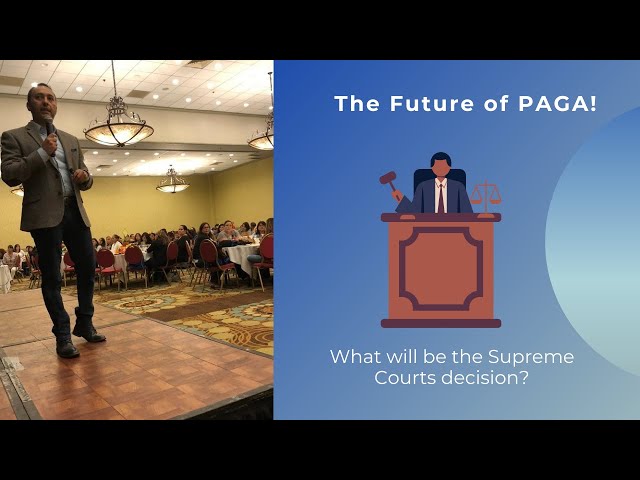
Posted on April 19th, 2022
Below is a complete transcript of this video.
What’s up fellow entrepreneurs today. I wanna talk about the Supreme court weighing in on an employer’s challenge to California’s PAGA laws, but first as always, I’m an attorney, but I’m not your attorney. So please seek out competent legal counsel for your specific question or concern.
So for those of you that have been hiding under a rock for the last few years, PAGA is a California label law that authorizes private attorneys, basically private citizens to Sue on behalf of other workers. Even if those workers have agreed to arbitrate their claims individually, in other words, one employee can Sue on behalf of all other employees.
Even if those employees do not agree to be represented in the suit. Yes, unbelievable. This of course has created lots of abuse and created more opportunities for litigation where it didn’t otherwise exist.
The case being weighed in by the Supreme court is called Viking River Cruises v. Moriana, and will determine if companies and their employees are able to resolve labor disputes through arbitration companies prefer arbitration because employment lawsuits are costly and arbitration clauses usually require each individual employee to bring their own individual grievances in front of an arbitrator.
That is usually a former judge plaintiff’s attorneys do not like because they would prefer to represent several employees in one case instead of one aggrieved employee in their specific case, this allows for much larger awards and much larger legal fees, because there are more plaintiffs. And of course, juries are more friendly to plaintiffs.
PAGA was enacted in California in 2004 because California, you said it didn’t have enough staff to police industries where labor law violations are the most rampant, including agriculture, garment, construction, carwash, and restaurants.
So what are they doing with all our tax money, even though California’s made this claim, PAGA claims have affected every industry in California, not just those industries, California claims have have of rampant violations.
Often plaintiff’s attorneys will file a labor claim on behalf of one employee, but then add PAA claims, which make it more likely for the case to settle in favor the employees, whether the claim is true or not under PAA, 75% of the penalties collected are to be returned to the state while the remainder is divided amongst the employees and the attorneys.
So a group of California employers filed suit because they claim that even if well-intentioned PAGA has become a means to enrich enrich plaintiff’s law firms, they file claims at a rate of 17 per day, according to these businesses. And they demand penalties for tens of thousands of employees at a time and extract millions of dollars for employers at don’t know if that’s exaggeration or not.
The issue for the Supreme court is whether the federal arbitration act of 1925 preempts or trumps the California private attorney’s law for more than a decade.
The high court is regularly cited with businesses. And in favor of arbitration, the justices have ruled businesses may enforce arbitration clauses that prevent workers or consumers from filing broad class action claims.
The 19 25 25 law was originally designed to uphold arbitration agreements between companies that signed contracts to ship goods by a railroad or MYC.
More recently though, it’s been transformed into a pretty powerful weapon for companies seeking protection from class action claims, but California has been a holdout ruling that plaintiffs may sometimes join together to Sue under state law.
In 2014, the state Supreme court said the federal arbitration act did not prevent the state from authorizing private attorneys to enforce its labor laws.
The case before the court began when Angie Mona quit her job as a sales agent in Los Angeles for Viking cruises and complained, she did not receive her last paycheck. So she became the lead plaintiff in a private suit, alleging violations, on behalf of a large group of Viking employees, Viking asked the Los Angeles superior court judge to block the lawsuit and send her case to arbitration.
The company said she had agreed to arbitrate any dispute arising out of relating to her employment, a contract, moreover, she had waived any right to any class collection or private attorney general action, but the judge and a state appeals court refused and ruled that the under California law, the private suit may proceed because the state is the real party bringing the claim.
I don’t know the Supreme, the state Supreme court turned down an appeal, but in December, the us Supreme court agreed to hear Viking’s appeal. Court will hand down a decision in the case by late June, anyway, fellow entrepreneurs let’s keep our fingers crossed.
We know what Bo is doing to small businesses in our state. So until next time be productive.


